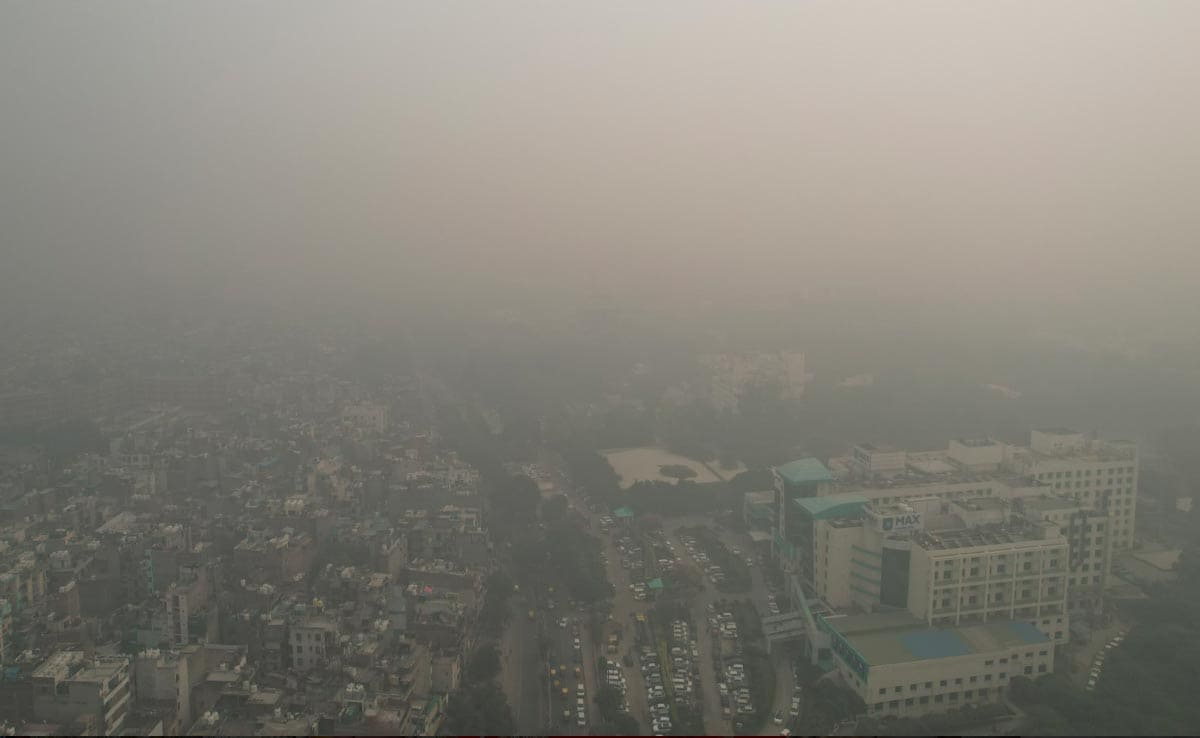


As winter sets in, North India is facing a hazardous rise in air pollution, with several cities recording ‘severe’ and ‘very poor’ air quality. Delhi, the nation’s capital, is currently covered in thick smog, causing the Air Quality Index (AQI) to reach dangerous levels. In response, the Delhi administration has implemented anti-pollution measures and advised vulnerable populations to limit outdoor activities. While some cities, such as Patna and Lucknow, also faced ‘very poor’ air quality, others like Pune, Hyderabad, Mumbai, Kolkata, Bengaluru, and Ahmedabad saw ‘moderate’ or even ‘satisfactory’ levels.
Delhi's Air Quality Crisis: A Growing Concern for North India
As winter descends upon North India, one of the most pressing issues facing the region is the alarming rise in air pollution. Several major cities, including Delhi, the nation's capital, have been blanketed in thick smog, pushing the Air Quality Index (AQI) to hazardous levels.
Background
Air pollution in India has been a chronic problem for decades, with major sources including vehicle emissions, industrial activities, construction dust, and agricultural burning. During the colder months, weather conditions such as temperature inversion and low wind speeds trap pollutants near the ground, exacerbating the situation.
Current Situation
The situation in Delhi is particularly concerning, with AQI levels consistently exceeding 400, which falls into the "severe" category. This has prompted the Delhi administration to issue anti-pollution measures, such as:
Other cities in North India, including Patna, Lucknow, and Jaipur, have also experienced severe air quality degradation, with AQI levels ranging from 300 to 450.
In contrast, cities in South India, such as Pune, Hyderabad, Mumbai, Kolkata, Bengaluru, and Ahmedabad, have generally enjoyed moderate to satisfactory air quality, with AQI levels below 200.
Health Impacts
Exposure to high levels of air pollution can have severe health consequences, including:
Vulnerable populations, such as the elderly, children, and those with pre-existing health conditions, are at increased risk.
Top 5 FAQs
1. What are the major sources of air pollution in India? A: Vehicle emissions, industrial activities, construction dust, and agricultural burning.
2. Why is air pollution worse during winter? A: Temperature inversion and low wind speeds trap pollutants near the ground.
3. What are the consequences of exposure to high levels of air pollution? A: Respiratory problems, cardiovascular disease, premature death.
4. What measures are being taken to address air pollution in Delhi? A: Anti-pollution measures, such as a ban on construction activities and odd-even vehicle restriction plan.
5. How can individuals protect themselves from air pollution? A: Wear masks, limit outdoor activities, use air purifiers, and stay informed about air quality conditions.
Conclusion
The air pollution crisis in North India is a serious threat to public health. The Delhi administration and other authorities are taking steps to address the situation, but long-term solutions that tackle the root causes of pollution are needed. Individuals can also play a role by reducing vehicle emissions, supporting clean energy initiatives, and advocating for clean air policies.

The video of a unique farewell given to IAS officer Sanskriti Jain has been making rounds on social media, drawing admiration and praise for its emotional touch. The former Collector of Madhya Pradesh's Seoni district was seen being carried in a decorated palanquin by her colleagues and staff, accompanied by her two young daughters. Her tenure in Seoni was marked by her dedication, people-oriented work, and close interactions with the district administration and residents. The warm speeches, garlands, and sense of camaraderie at the event reflected the strong bond between Sanskriti Jain and her team in Seoni.

Shani Jayanti, the day dedicated to the worship of Lord Shani, falls on May 27, 2025, coinciding with Jyeshtha Amavasya. As per Udayatithi, the puja and rituals should be performed on the same day. However, certain tasks should be avoided on Shani Jayanti. Read on to know the significance of this day and the dos and don'ts to please Shani Dev.

Chief Minister Yogi Adityanath visited the Shanti Ashram in Lucknow to pay his last respects to Sant Shiromani Sai Chanduram, the head priest of the Ashram. He draped the mortal remains of Sant Shiromani with a saffron Angvastra and paid homage before his statue. Expressing deep sorrow over his demise, the Chief Minister wrote on social media about the irreparable loss of the spiritual leader. A large number of devotees gathered at the Ashram premises to offer their tributes and follow his teachings and ideals.

In an effort to improve vision care in rural India, the Bhaktivedanta Hospital & Research Institute held a Mega Eye & Dental Camp in Barsana, Uttar Pradesh. Equipped with state-of-the-art technology, the hospital aims to perform over 5000 PHACO procedures, free of cost, for those in need. The support of Tata Capital Ltd. enabled the camp to expand its reach to over 50,000 beneficiaries and receive the support of esteemed dignitaries including Smt. Hema Malini Ji and Smt. Nupur Desai.

Indian society has a narrow and sexist definition of parvarish, praising daughters who conform to traditional gender roles and blaming parents if they don't. However, it's time to focus on dismantling patriarchy within the household and raise a feminist generation. This means providing equal education to both daughters and sons, encouraging critical thinking and questioning societal norms. Parvarish should not mean curbing basic legal rights but rather empowering individuals to make their own decisions and think for themselves.

India's festival of lights, Deepawali, has been officially recognized by UNESCO as an intangible cultural heritage of humanity. The inscription acknowledges the festival's cultural significance and its ability to bring communities together. Prime Minister Narendra Modi welcomed the announcement, stating that Deepawali holds a special place in India's culture and represents values such as hope and righteousness. This recognition is expected to increase the festival's global popularity even further.

During Prime Minister Narendra Modi's recent visit to Tokyo, the city welcomed him with the soulful chanting of the Gayatri Mantra, one of the most sacred and powerful verses in Indian spiritual tradition. This ancient mantra, found in the Rig Veda, is believed to have a mental healing effect due to its repetitive and focused chanting. Research has also shown that it can improve well-being and provide a sense of peace and connection for both religious and non-religious individuals.

The M3M Foundation unveils 'Payal@40' campaign to commemorate Dr. Payal Kanodia's 40th birthday on December 9, 2025. This campaign, which aims for comprehensive impact across education, healthcare, skill development, and women's empowerment, reflects a leadership approach rooted in service and compassion. With the vision of Dr. Kanodia, the campaign marks a pivotal moment for the Foundation's ongoing mission of equitable development in India.

In a unique move to promote tourism, Madhya Pradesh Chief Minister Mohan Yadav has planned to hold cabinet meetings at famous heritage sites in the state. The latest meeting will take place at Khajuraho Convention Centre, known for its architectural wonders. The two-day visit will also include a jungle safari in Panna Tiger Reserve and review meetings of various departments, highlighting the state's vast natural and cultural beauty.

The main accused and owners of the Goa nightclub where a massive fire killed 25 people have fled to Phuket, according to Goa Police. The police have coordinated with Interpol to apprehend the accused as a Look Out Circular was issued against them. Meanwhile, an employee of the club has been arrested and the postmortem on all 25 deceased has been completed.